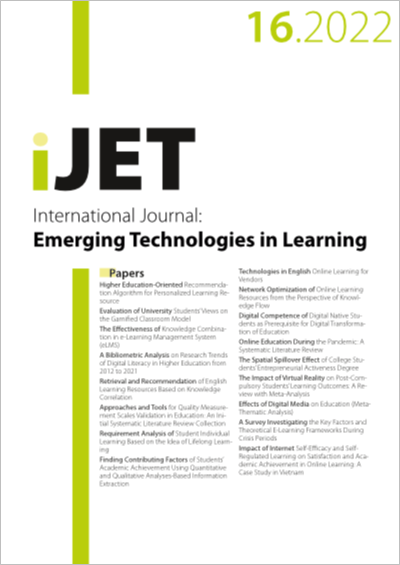Higher Education-Oriented Recommendation Algorithm for Personalized Learning Resource
DOI:
https://doi.org/10.3991/ijet.v17i16.33179Keywords:
LSTM, Q matrix, Personalized learning, Learning efficiency, Higher educationAbstract
As smart education is continuously deepened in higher education, personalized learning resource recommendation has developed into a significant research field of smart learning. Although the prediction accuracy has been improved by knowledge tracing models established on the basis of students’ historical learning data, how to design and apply personalized learning recommendation by combining classroom teaching of higher education is a great difficulty.To recommend personalized learning resources meeting the teaching requirements in higher education, the Q-LRDP-D (Learning Resource Difficulty Prediction and Dijkstra based on Q matrix) algorithm was proposed in this study. First, learning resources were modeled in accordance with Q matrix theory. Then, students’ learning difficulty was predicted through the long short-term memory (LSTM) algorithm of a learning resource difficulty prediction module, followed by cyclic prediction through combining the to-be-learned knowledge points as required by teaching units to form a directed path diagram of learning resources. Next, the least learning resources conforming to students’ learning levels were recommended using the shortest path algorithm to complete learning tasks. Lastly, the accuracy and effectiveness of the established model were verified through undergraduate teaching experiments. Results demonstrate that the modeling of learning resources in higher education on the basis of Q matrix theory is applicable to the LSTM algorithm. In comparison with the benchmark algorithm, its precision is obviously improved. With the recommendation algorithm, the average return on learning resources in the experimental class is 6.31, which is considerably higher than that in the control group. This study provides a certain reference for improving students’ learning efficiency through recommendation algorithms in higher education and teaching.
Downloads
Published
2022-08-31
How to Cite
Zhang, L., Zeng, X., & Lv, P. (2022). Higher Education-Oriented Recommendation Algorithm for Personalized Learning Resource. International Journal of Emerging Technologies in Learning (iJET), 17(16), pp. 4–20. https://doi.org/10.3991/ijet.v17i16.33179
Issue
Section
Papers
License
Copyright (c) 2022 Liang Zhang, Xiao Zeng, Ping Lv

This work is licensed under a Creative Commons Attribution 4.0 International License.


